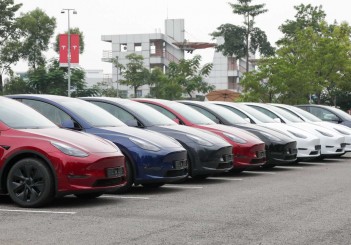SEOUL: South Korea will consider scrapping a rule next year that denies subsidies for electric vehicles with high-capacity batteries, a move that could open its market to more long-range models including some from Tesla Motors Inc.
The country is a major market for premium cars, and ranks in the top six in terms of reservations for Tesla's upcoming Model 3 even though the US automaker will not enter Korea until early 2017.
But when Tesla does enter the market, one of its launch cars - the Model S 90D - will not qualify for a subsidy that knocks as much as 20 percent off the price of EVs. The Model S 90D is one of Tesla's higher-priced cars and is crucial to the firm in dispelling one of the general concerns about EVs: their range.
Currently, buyers of EVs that fully charge in under 10 hours using a standard electricity supply receive up to 22 million won (US$18,328). The Model S 90D and latest e6 from China's BYD Co Ltd likely take longer, industry officials say.
Minister of Environment Cho Kyeung-kyu in October said the 10-hour rule was introduced in 2012 to reduce the inconvenience of long charging times, but that it was time to review it considering the charging times of current long-range models.
A ministry official said a government-appointed consultancy will submit a proposal on the matter "by June, but it could be much earlier."
"We haven't decided whether to keep the rule alive, or kill it, or come up with complementary rules," the official said.
Tesla's first showroom is in the Starfield shopping centre east of Seoul that it aimed to open by year-end. A delay in the registration necessary to start sales has pushed the opening to early next year, a person familiar with the matter told Reuters.
BYD, the world's largest EV maker, also planned to enter Korea earlier this year with its e6 but delayed because its latest model is ineligible for the subsidy, a person familiar with the matter told Reuters.
BYD declined to comment on the matter. Tesla was not immediately available to comment.
Korea ranks 11th by total vehicle sales, according to researcher IHS Automotive, but within the top five for high-end models such as Daimler AG's Mercedes-Benz S-Class and BMW's 7 series, the German automakers said. That makes it an attractive market for premium carmaker Tesla, whose price competitiveness would be enhanced by the subsidy rule change.
Tesla Vice President Nicolas Villeger last month said the automaker was working with the government to change a "unique rule" that does not reflect advances in battery technology.
A month earlier, opposition lawmaker Lee Sang-don called the rule an "unreasonable non-tariff barrier" that deprives consumers of incentives to buy long-range EVs.
"The rule is meaningless," Kim Pil-soo, president of the Korean Electric Vehicle Association, said. "We have kept telling the government they should remove it."
Korea is addressing a worsening smog problem but has been relatively slow to adopt EVs. There are some 4,000 EVs on the road which puts Korea 14th of 16 members of the Electric Vehicles Initiative, a global forum for EV development.
Similarly, foreign rivals such as Japan's Nissan Motor Co Ltd have marketed EVs for several years, whereas Korea's biggest automaker by sales, Hyundai Motor Co , released its first mass-produced EV only this year.
Hyundai's Ioniq can run 191km on a full charge of 4 hours and 25 minutes using a standard power supply. The automaker plans a 320 km car for 2018 requiring a larger-capacity battery, like Tesla's Model S 90D which can run 472km.
Tesla has been taking Korean orders since August for its Model S, Model X and Model 3, some variants of which may not qualify for the subsidy.
The automaker also has plans to install high-voltage "superchargers" in Seoul, Busan and Pyeongchang, with charging times reduced to minutes instead of hours, Villeger said.
That would add to government plans to increase its 750 fast chargers to 2,000 next year and 3,000 by 2020, catering to a targeted 250,000 EVs.
In the meantime, Tesla's first step would be to unlock its showroom which, last week, still bore the sign, "Opening Soon".










